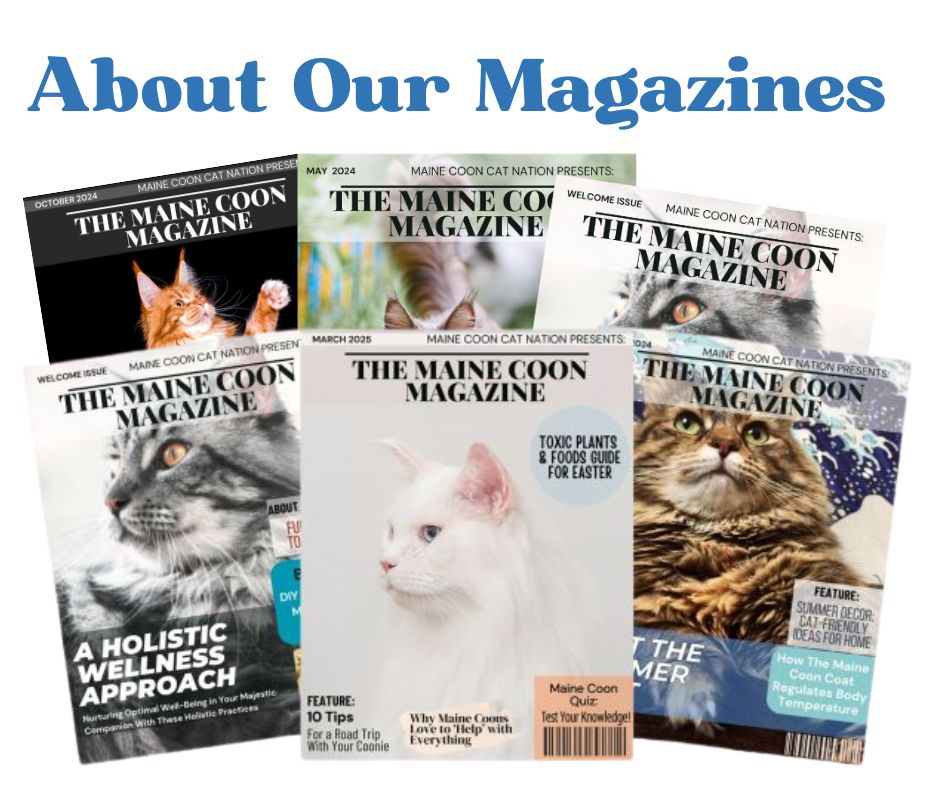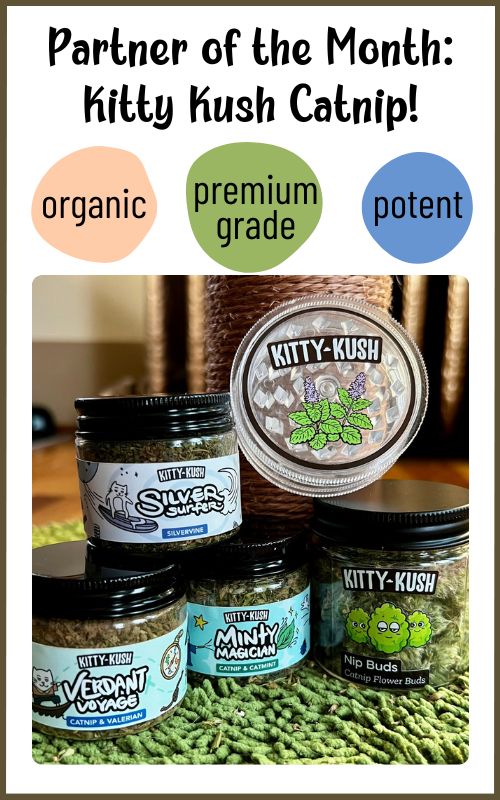- Home
- Maine Coon Personality
- Are Maine Coon Cats Mean?
Are Maine Coon Cats Mean?
The Facts About Aggression
Are Maine Coon Cats mean? Has anyone ever told you these cats are wild, aloof, grumpy, or mean?
Here are the facts about aggression and breed temperament. Let's talk about the arrogance myth!
Many folks take it for granted that all cats are aloof, end of story. They do what they want, when they want, don't answer to anyone, and even consider humans to be their servants!
We see this trope again and again in books and media.
Further, the large, rough-and-tumble appearance of Maine Coons can cause newcomers to this breed to wonder: "are Maine Coon Cats mean?"
They do have large bodies, large heads and some have a wild, almost primal facial expression. They are gorgeous!
The Truth About Maine Coons and Aggression
This breed is actually known for being friendly and docile. They are loving companions, often lap cats who purr easily and become very bonded to their family.
Their personality is as far from mean or aggressive as it could possibly be!
In fact, according to the breed description, they have "an essentially amiable personality." That means friendly!
If anyone ever asks you "are Maine Coon Cats mean?" you can confidently say no, they are as sweet as possible.
Their lovely disposition is one of the best things about this breed, and an important reason why people ultimately remain Coonie fans for life. They truly are gentle giants.
"Then why is my Maine Coon mean?"
Cats are a lot like people. Any cat, no matter how gentle, patient and loving can have a moment where they metaphorically say to us "ok, that's the last straw!"
With such a wide array of circumstances and personalities to consider, there is no one-size-fits-all reason for a cat to show aggression.
It really comes down to reading your pet's body language, knowing their personality, and just generally being in tune with them. Here are some reasons any cat may be "mean":
- Kitten placed in new home too young and not properly socialized. In a sense, they are insecure. One of the reasons Maine Coon breeders keep kittens till around 12-14 weeks of age is to allow them time to become secure and well-adjusted.
- Rescue cats who have been through any variety of unknown trauma or mistreatment. Alternatively they may just be "off" until they feel secure in their new home. Being relocated makes them understandably nervous.
- Kitties who really hate being groomed can be aggressive. They may have sensitive skin, or a psychological fear or other association with grooming.
8 stressors that may cause cat behavior issues:
- New pet(s) added to the household
- Home renovations
- A case of fleas
- A new baby
- Relocation of a litter box
- Change in food
- Stomach upset
- Undiscovered illness such as urinary tract infection or diabetes
"Are Maine Coon Cats Mean?"
Many long haired domestic (LHD) cats and medium haired domestic (MHD) cats can share traits with Maine Coons such as a friendly disposition, larger-than-average size, affinity for water or being talkative.
As a result, these cats are often become labeled Maine Coon or Maine Coon mix. Sometimes a shelter employee or veterinarian will suggest this may be a Coonie or part-Coonie.
If these fluffy rescue kitties have a problem with aggression, these anecdotal stories may contribute to the myth of the Maine Coon Cat breed being mean.
Keep in mind that a suspected Maine Coon may or may not have the happy, gregarious temperament that we can expect from a purebred.
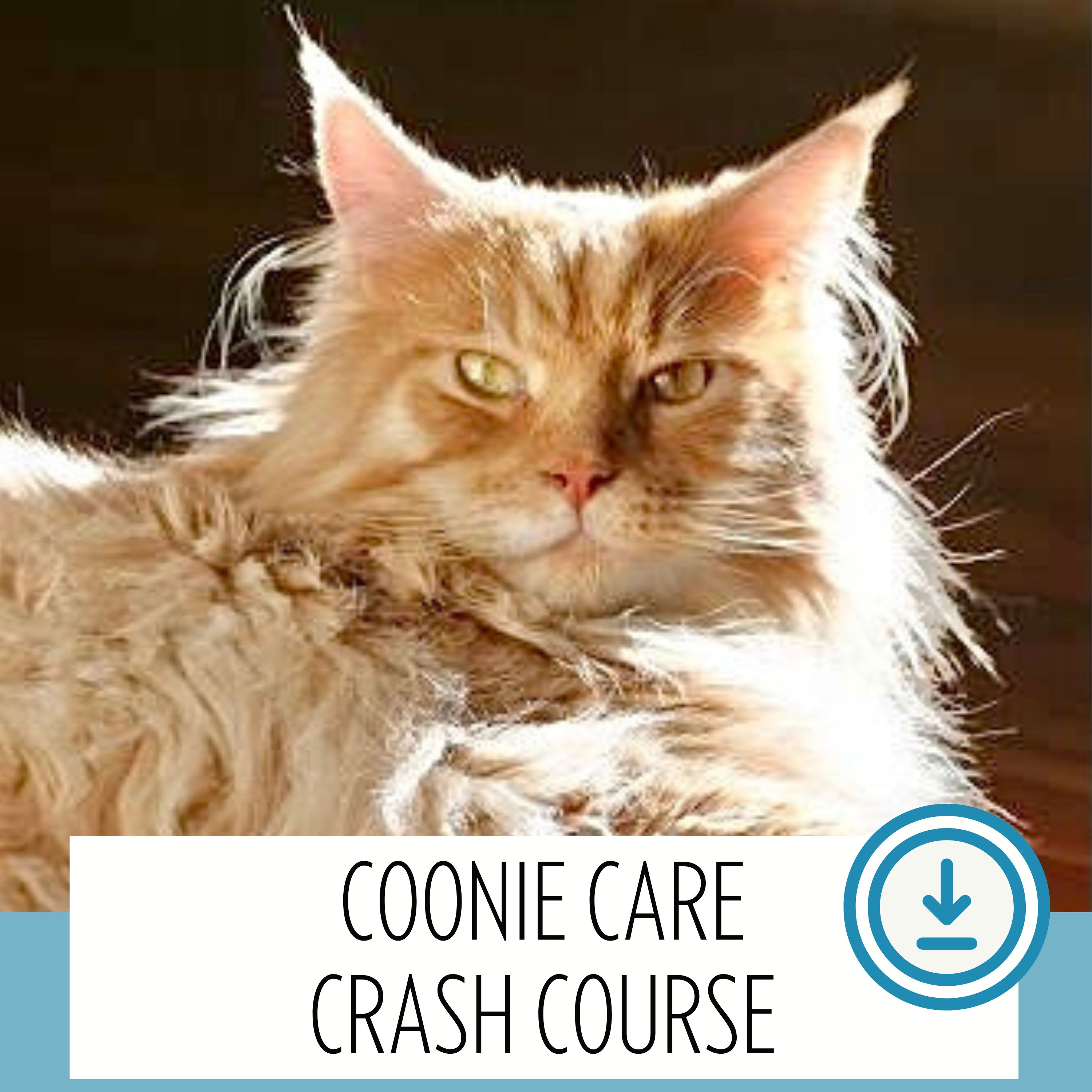
Cats Are Emotional:
Just exactly what emotions they feel, and to what extent is up for debate, but there is no denying this evidence:
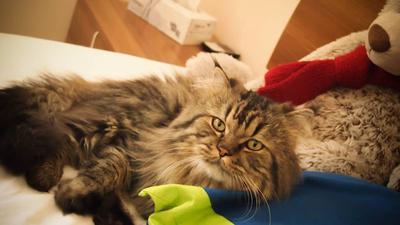
Purring: The most obvious of all the behavior clues is purring. We know cats and kittens purr when they feel contentment.
Occasionally a cat will purr in a fear or pain situation often to soothe himself.
Contentment is an emotion, a feeling! Here are some synonyms: Pleasure, fulfillment, peace, and gladness.

Growling and Hissing: We know cats do this when they are scared or threatened. Fear is most definitely an emotion.
Have you ever gone on vacation, and had a caretaker for your cats? We have, and even if the caretaker is a familiar family member, staying in the home, the cats were very off.
What emotion is this? It's hard to say. Perhaps they were worried, confused, or even sad. But it had nothing to do with being fed!

Maine Coon Cats Bond to Their Owners:
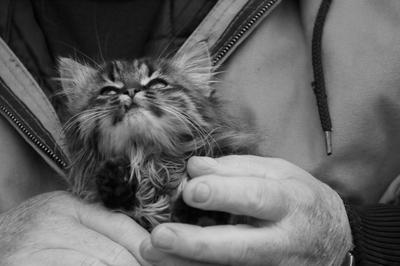
Studies have actually been done to see if cats recognize their human owners. (Well, we already knew that of course they do!)
In these studies, cats were presented with different voices. They exhibited tell-tale behaviors only when hearing their family members.
Some people claim that cats 'manipulate' their owners. They claim that the rubbing, purring and other behaviors coax us to fawn over them and care for them, and in this way cats ensure they are fed and catered to.
There's a major flaw in this theory though!
Our feline friends sleep with us, snuggle with us, greet us at the door after work, yes even miss us when we're gone, and the hours and hours spent in happy companionship are certainly not a "game plan" to get their food dish filled!
They do these things because they enjoy it as much as we do.
Meowing: Maine Coons love to have conversations with their people. It reminds me of the movie "Guardians of the Galaxy."
A character in the movie, named Groot, is only able to verbalize one phrase: "I am Groot." So no matter what he said, it came out as "I am Groot." It was interesting and fun to note that the other characters knew exactly what he meant even though he always said the same thing.
Arrogant? I Think Not!
This often comes up when comparing cats to dogs. Dogs have been bred and trained for thousands of years to obey commands. Cats have been domesticated as well, but as companions.
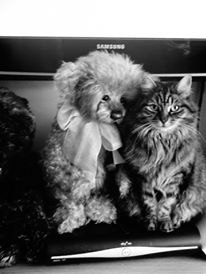
An intelligent Maine Coon will greet you at the door every evening (like a puppy-cat!), will come when called, often from anywhere in the home - even upstairs fast asleep on the bed!
They are as social and interactive as most dogs, even more so than many!
Why do cats have a reputation as being stoic?
In the wild, when weak or injured or in pain, a feline will hide it so as not to become a target by a predator. It's nature's way.
Even though we would help care for a cat in need, instinct takes over.
They are also more independent as we know, loving our company but able to spend a day alone without complaining.
Sleep plays a role in the aloof misnomer as well. As cats spend 16-20 hrs a day sleeping, they are often off sleeping (and in many cases snoring!) while their canine counterparts are eager to play and obey.
So, are Maine Coon cats mean? We've definitely dispelled this notion. This breed is extremely loving, friendly and touchable. They are not, as a matter of sweeping definition, aggressive or mean at all.
There will be folks who report that their pet of any species or breed has behavior problems.
But for anyone who is researching this breed, getting to know this breed, or especially considering committing to this breed by locating a responsible, ethical breeder - the answer to this question is "no, the Maine Coon breed is not mean."
You can confidently expect your new Coonie to be a big love.
Top of: Are Maine Coon Cats Mean
« Back to Maine Coon Personality
Recent Articles
-
Memory Lane Month Begins!
Apr 15, 25 10:22 PM
We're thrilled to start our "Memory Lane Month" event by visiting some cherished moments from our community! We're in the process of restoring meaningful community stories like this one, to preserve t… -
Will a Maine Coon Protect Its Owner From Danger or an Intruder?
Apr 09, 25 10:41 PM
Plenty of people are curious: Will a Maine Coon protect its owner if something happens? Let’s talk about what this means, and what kind of protector a Coonie is. -
9 Types of Maine Coon Cats and How to Tell Them Apart
Apr 09, 25 03:58 PM
When people say "types of Maine Coon cats," they're usually talking about color. But as Coonie lovers know, there’s a lot more to it than that! From wild-looking European lines to polydactyl paws and…
